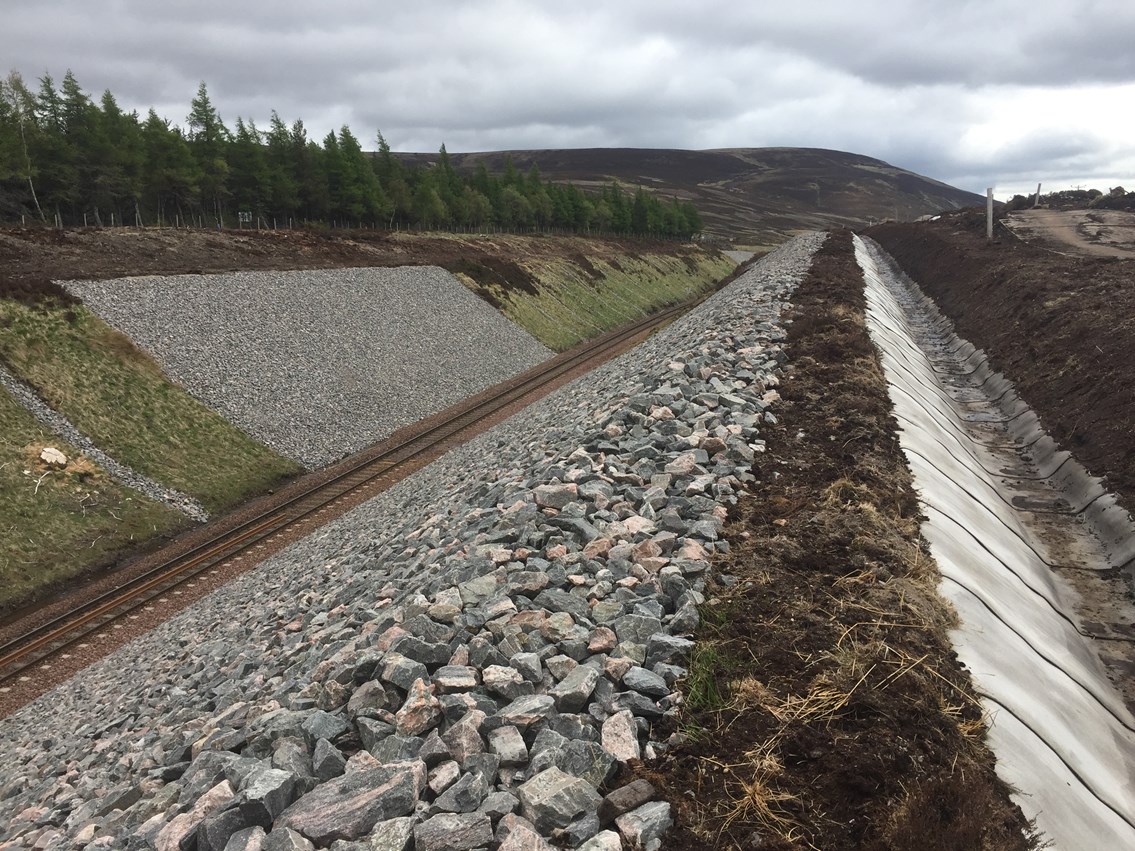Friday 5 Jun 2020
Project protects Highland railway from impacts of unpredictable weather
- Region & Route:
- Scotland’s Railway: Scotland
Work is about to get underway on a final phase of embankment and drainage work at Slochd between Perth and Inverness on the Highland Mainline.
The project, which will be ongoing until November will help protect against landslips and rockfall and also address a known flooding risk area which has caused delay and cancellation to passenger journeys twice in the last twelve months.
It represents an investment of £4.8 million to protect the infrastructure.
Work will see installation of a new piped drainage system and earth-bunds, as well as concrete lined ditches to manage the flow of water away from the railway to culverts and natural water courses.
The project, which is being delivered over two kilometres of railway has been on site at Slochd since September 2019 and has targeted known areas of embankment with a history of instability and prone to rock-fall and flooding.
To date, the project has utilised 11,000 tonnes of stone to regrade more than 400 metres of railway embankment which is 14 metres high in sections. In addition, more than 840 metres of concrete lined drainage channels have been created and rock-netting has been installed where required.
110 metres of ballast retention has also been added to support the crest at the top of the embankments and to provide a new secure cable troughing route on the side of the line.
The project is part of a wider package of geotechnical work designed to identify and proactively deliver work required to address known, or potential, areas where the risk of flooding, embankment slip or rock-fall is high and to avert the associated passenger disruption that these issues could cause.
Mark Wilson, Network Rail’s project manager for the work at Slochd said, “The unpredictable nature of the Scottish weather means that storms or flooding can happen at any time of the year.
“Milder and wetter weather means that drainage in some areas is no longer fit for purpose and can get overwhelmed. We are proactively replacing and increasing the capacity of drains and culverts to manage the larger volumes of water coming onto the railway from adjacent land on a more frequent basis.
“Work at Slochd will address a flooding issue which has caused the line to be closed twice in the last twelve months; once due to snow melt and the other due to an August storm. It will also ensure that the surrounding drainage and embankments are future-proofed to protect the railway from the impact of increasingly unpredictable weather.”
Work at Slochd is being delivered in line with government advice on physical distancing using additional protective equipment and learning new ways of working that will help keep everyone safe and let us get the job done.
Contact information
Passengers / community members
Network Rail national helpline
03457 11 41 41
Latest travel advice
Please visit National Rail Enquiries
Journalists
Network Rail press office - Owen Campbell
NR Press Office 0141 555 4108 / 07515 617073
Owen.Campbell1@networkrail.co.uk
About Network Rail
We own, operate and develop Britain's railway infrastructure; that's 20,000 miles of track, 30,000 bridges, tunnels and viaducts and the thousands of signals, level crossings and stations. We run 20 of the UK's largest stations while all the others, over 2,500, are run by the country's train operating companies.
Usually, there are almost five million journeys made in the UK and over 600 freight trains run on the network. People depend on Britain's railway for their daily commute, to visit friends and loved ones and to get them home safe every day. Our role is to deliver a safe and reliable railway, so we carefully manage and deliver thousands of projects every year that form part of the multi-billion pound Railway Upgrade Plan, to grow and expand the nation's railway network to respond to the tremendous growth and demand the railway has experienced - a doubling of passenger journeys over the past 20 years.
Follow us on Twitter: @networkrail
Visit our online newsroom: www.networkrailmediacentre.co.uk

